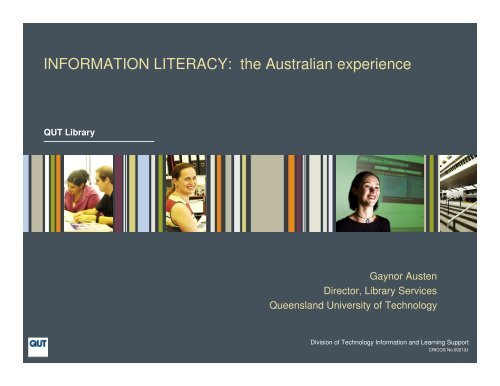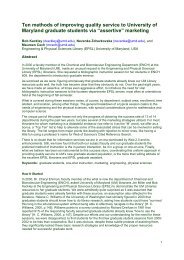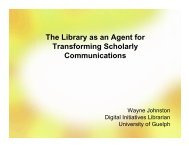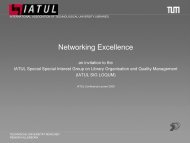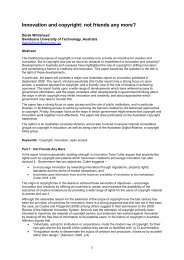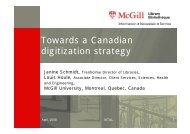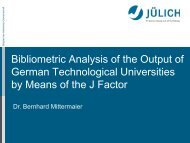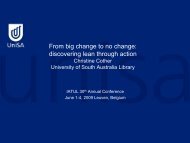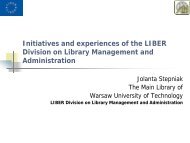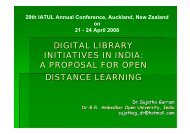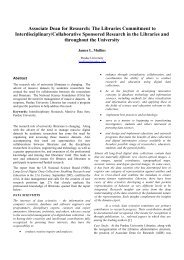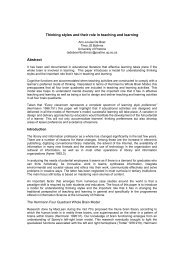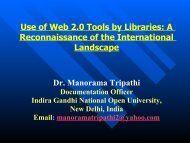Presentation - IATUL
Presentation - IATUL
Presentation - IATUL
Create successful ePaper yourself
Turn your PDF publications into a flip-book with our unique Google optimized e-Paper software.
INFORMATION LITERACY: the Australian experience<br />
QUT Library<br />
Gaynor Austen<br />
Director, Library Services<br />
Queensland University of Technology<br />
Division of Technology Information and Learning Support<br />
CRICOS No.00213J
Essential elements of IL within universities<br />
• Close cooperation between academics and librarians is required<br />
• Information skills must be taught in context, not in a vacuum<br />
• Librarians have an important perspective to contribute to the<br />
teaching/learning process<br />
• Librarians have a teaching role, focussing on information and the<br />
skills required to access and use it<br />
• Skills for lifelong learning should be a fundamental outcome of a<br />
university education<br />
• This skill development needs to be built in as part of curriculum<br />
design (Ross report [1990])<br />
QUT Library<br />
CRICOS No.00213J
Recent developments<br />
2000<br />
2001<br />
2001<br />
2002/3<br />
2004<br />
Australian Information Literacy standards (1 st edition)<br />
developed<br />
Australian Library and Information Association (ALIA)<br />
Workshop on Information Literacy<br />
Establishment of ANZIIL – the Australian and New<br />
Zealand Institute for Information Literacy<br />
Most Universities produce statements on the<br />
development of graduate attributes, including information<br />
literacy<br />
Publication of 2 nd edition of Australian Information<br />
Literacy Framework: principles, standards and practice<br />
QUT Library<br />
CRICOS No.00213J
QUT Library<br />
CRICOS No.00213J
QUT’s Information Literacy journey<br />
Travelling the road:<br />
From generic - to integrated<br />
From integrated - to embedded<br />
ie From “add on” - to an integral and assessed<br />
part of the curriculum<br />
From emphasis on teaching -<br />
to emphasis on learning<br />
QUT Library<br />
CRICOS No.00213J
Markers of success<br />
• Institutional ownership of information literacy<br />
• Active engagement between librarians and academics<br />
• Methodical curriculum reform<br />
• Development of high quality resources<br />
• Focussed professional development of teaching librarians<br />
QUT Library<br />
CRICOS No.00213J
Specific tools for the QUT journey<br />
PILOT: Your Information Navigator<br />
one of the first online information literacy tutorials in Australia (2000),<br />
incorporated as weighted & non-weighted components of study, & subsequently<br />
adapted for use by 12 institutions in Australia, the UK & Canada<br />
CRICOS No.00213J<br />
QUT Library<br />
CRICOS No.00213J<br />
© QUT Library/J.Peacock: 2005
Policy<br />
guiding principles, aims & outcomes<br />
of the University's information<br />
literacy strategy as a whole & in its<br />
constituent parts (linked to ANZ IL Standards)<br />
teaching resources<br />
to facilitate the design, development,<br />
delivery & evaluation of curriculum to<br />
embed information literacy<br />
endorsed as university policy in 2000<br />
CRICOS No.00213J<br />
QUT Library<br />
CRICOS No.00213J<br />
© QUT Library/J.Peacock: 2005
IFN001: Advanced Information Retrieval Skills<br />
the only compulsory, credit-bearing information literacy course in Australia,<br />
available since 1989<br />
all doctoral students are automatically enrolled by the Office of Research<br />
& Research Training & must complete IFN001 by Stage 2 confirmation<br />
2005 Online mode introduced<br />
CRICOS No.00213J<br />
QUT Library<br />
CRICOS No.00213J<br />
© QUT Library/J.Peacock: 2005
PILOT revision to incorporate new learning paradigms<br />
PILOT: Your Information Navigator<br />
provides an outcomes matrix for academics to facilitate development<br />
of learning outcomes, assessment & assessment criteria<br />
CRICOS No.00213J<br />
QUT Library<br />
CRICOS No.00213J<br />
© QUT Library/J.Peacock: 2005
Mapping our information literacy programs<br />
KPI Information Literacy Footprint<br />
using national benchmarks to determine<br />
levels of influence, engagement &<br />
compliance<br />
CRICOS No.00213J<br />
QUT Library<br />
CRICOS No.00213J<br />
© QUT Library/J.Peacock: 2005
Knowledge/skills requirements for librarians<br />
• Teaching & learning theory<br />
• Information literacy theory & principles<br />
• Curriculum design<br />
• ICT-supported instructional design<br />
• Assessment principles & practice<br />
• Classroom management techniques<br />
• Online facilitation techniques<br />
• <strong>Presentation</strong> skills<br />
• Evaluation processes & practices<br />
QUT Library<br />
CRICOS No.00213J
IL integration in the Faculty of Creative Industries<br />
Contextualised, active learning<br />
IL learning is designed to:<br />
• integrate with unit learning<br />
• support the information skills required to complete unit<br />
assessment<br />
• provide opportunities for students to apply skills, knowledge<br />
and understandings<br />
• be assessed<br />
• be developmental over a course<br />
• no hurdle assessment!<br />
QUT Library<br />
CRICOS No.00213J
IL reality for CI teaching staff<br />
• time-poor!<br />
• little time to keep up to date with resources<br />
• under resourced – large classes<br />
• so many curriculum issues to consider, eg. internationalising the<br />
curriculum, indigenising the curriculum, providing online learning<br />
options<br />
• IL help is often appreciated<br />
• they see us as the IL and info resources experts<br />
QUT Library<br />
CRICOS No.00213J
CIF learning & teaching projects<br />
Mapping discipline graduate capabilities. The process:<br />
1. identify course objectives – discipline specific and generic (eg.<br />
information literacy)<br />
2. “map” the development of each learning objective through the<br />
course – where is it taught, practised and assessed?<br />
3. identify the “gaps,” to design new opportunities for learning<br />
4. look for suitable units to offer developmental IL learning, eg. first<br />
year, second year, third year<br />
5. identify specific IL learning objectives and design appropriate<br />
learning activities and assessment<br />
QUT Library<br />
CRICOS No.00213J
QUT Library<br />
CRICOS No.00213J
KKB018 Creative Industries<br />
QUT Library<br />
CRICOS No.00213J
KKB018 Assessment<br />
QUT Library<br />
CRICOS No.00213J
Lecturer/student – Di Nailon, School of Early Childhood, Faculty of Education<br />
“I sent my recent paper that is being reviewed for a conference to let you<br />
know that all the learning does go somewhere. I think the AIRS course is<br />
the most useful thing I have ever done…and I have been around as an<br />
academic for 24 years (finally having the courage to start getting on top of<br />
information technology – instead of using librarians and research<br />
assistants). I am putting stuff that I have found on my units’ web sites as<br />
well (as soon as I finish marking) – and linking students to the library page<br />
to help them get on top (learners together).”<br />
Unit Coordinator/lecturer – Luciennce Camenzuli, Faculty of Creative Industries<br />
“The information literacy program has made a real difference; providing<br />
students with a scaffold to develop the foundation information skills that are<br />
essential for university study….[it] has inspired students to begin their own<br />
investigative journey, now that they can see information as a “fuel” for the<br />
creative process.”<br />
QUT Library<br />
CRICOS No.00213J
Doctoral supervisor – Prof Guy G Gable, Coordinator ITN100 Research<br />
Methodology, Faculty of Information Technology<br />
“The information literacy component of the unit comprises one or two full<br />
weeks of the semesters’ teaching; up to four hours of teaching. The<br />
assessment for the unit is designed to focus on effective literature research<br />
and effective research design. Within this context, the information literacy<br />
component is vital to the completion of the assessment and the<br />
development of these students as researchers. I have been working the<br />
Faculty Liaison Librarian for several years to develop teaching and learning<br />
strategies for information research, that have proven extremely effective for<br />
these postgraduate students.”<br />
Director, Teaching & Learning – Assoc Prof Christine Bruce, Faculty of<br />
Information Technology<br />
“Serious attention to information literacy in many of QUT’s courses makes it<br />
possible to validate the claim that our graduates have acquired a capacity<br />
for lifelong learning.”<br />
QUT Library<br />
CRICOS No.00213J
Critical arguments in favour of institution-wide<br />
information literacy approaches:<br />
• Significance of learning how to learning in an information intensive<br />
era<br />
• Rapid obsolescence of content in undergraduate degree programs<br />
QUT Library<br />
CRICOS No.00213J
Acknowledgements<br />
• Judith Peacock, Information Literacy Coordinator, QUT<br />
• Alice Steiner, Liaison Librarian, Creative Industries Faculty, QUT<br />
QUT Library<br />
CRICOS No.00213J
Further relevant reading<br />
• Fell, P., Bradbury, S., Vollmerhause, K., & Peacock, J. (2003)<br />
“Pedagogy First, Technology Second: teaching & learning<br />
information literacy online”.<br />
http://eprints.qut.edu.au/archive/00000711/<br />
• Peacock, J., “Information literacy education in practice”.<br />
http://eprints.qut.edu.au/archive/00000706/<br />
QUT Library<br />
CRICOS No.00213J


